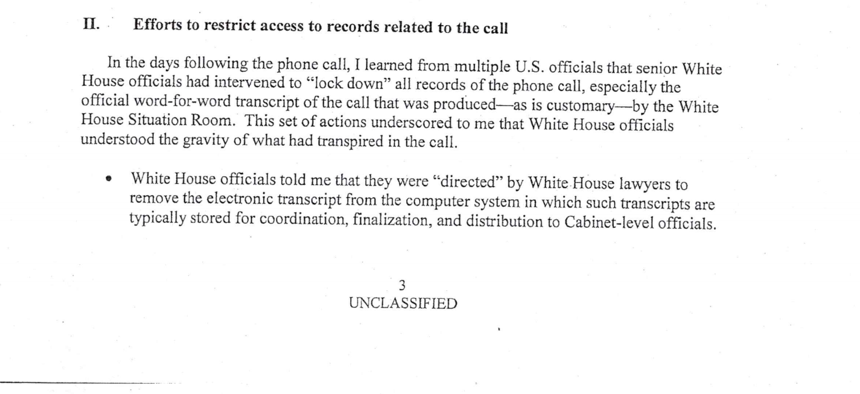
Screenshot of the August 12, 2019, whistleblower memo about alleged attempts by President Trump to solicit information from foreign powers to sway U.S. elections. Via the House Intelligence Committee
White House Used Classified System to Hide Trump’s Phone Call: Whistleblower
The IC employee wrote that the July 25 call to Ukraine was not the only time documents had been improperly hidden in codeword-level systems.
White House officials moved quickly to keep the contents of President Donald Trump’s controversial July phone call with the Ukrainian president under tight wraps, according to a complaint made by an unknown whistleblower that was given to Congress and released publicly on Thursday morning.
“In the days following the phone call,” I learned from multiple U.S. officials that senior White House officials had intervened to ‘lock down’ all records of the phone call,” the whistleblower wrote in his complaint. “This set of actions underscored to me that White House officials understood the gravity of what had transpired in the call.”
The whistleblower said that multiple White House officials told him that the rough transcript of the president’s call was put into a standalone computer system that is reserved for top-level intelligence information, not the computer system in which such transcripts are usually kept and distributed to Cabinet-level officials.
“Some officials voiced concerns internally that this would be an abuse of the system and was not consistent with the responsibilities of the Directorate for Intelligence Programs,” which manages the highly classified system, the complainant wrote.
The whistleblower also said that he was told by White House officials that the Ukraine call was “‘not the first time’ under this Administration that a Presidential transcript was placed into this codeword-level system solely for the purpose of protecting politically-sensitive—rather than national security sensitive—information.”
While the president’s private conversations are considered privileged, they are not always classified. Officials are not allowed to classify information just because it is politically sensitive or embarrassing, or because it covers up wrongdoing by anyone in government.
The House intelligence committee posted a lightly redacted version of the nine-page document, along with a seven-page cover letter from Intelligence Community Inspector General Michael Atkinson to Acting Director of National Intelligence Joseph Maguire.
“This is an allegation that has been made, not necessarily a true statement,” Maguire told the committee in an open hearing on Thursday morning. “There is an allegation of a cover-up. I’m sure an investigation might lend credence or disprove that. I have no knowledge of whether that is a true and accurate statement.”
In the July 25 phone call with Ukrainian President Volodymyr Zelensky, Trump touted U.S. aid to Ukraine and then asked him as a “favor” to work with Attorney General Bill Barr to investigate his 2020 rival Joe Biden’s role in the dismissal of a Ukrainian prosecutor widely seen as corrupt, according to a summary memo of the call released Wednesday by the White House after House Democrats vowed to begin formal impeachment proceedings.
The whistleblower wrote, Trump was “pressuring a foreign country to investigate one of the President's main domestic political rivals,” one of several actions that “pose risks to U.S. national security and undermine the U.S. Government's efforts to deter and counter foreign interference in U.S. elections.”
Critics say the whistleblower’s allegations reveal that the White House is illegally covering up an illegal abuse of power by Trump. Allies of the president insist that the president’s conversation was appropriate and have zeroed in on how the allegations became public in the first place.
“It appears that rules restricting access and knowledge of these sensitive calls was breached,” tweeted Fred Fleitz, a former National Security Council official under the Trump administration who at times has been rumored to be under consideration for a senior post. “This official was not on this call, not on the approved dissem list and should not have been briefed on the call.”







